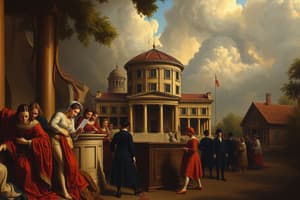Podcast
Questions and Answers
In a confederal system of government, power is:
In a confederal system of government, power is:
- Distributed among independent states (correct)
- Concentrated in a monarchy
- Shared between the central and state governments (correct)
- Held by a central government
When leaders use religious laws to govern, they most likely represent:
When leaders use religious laws to govern, they most likely represent:
Theocracy
Which legal change after the American Revolution likely resulted from the grievance of depriving us of the benefits of Trial by Jury?
Which legal change after the American Revolution likely resulted from the grievance of depriving us of the benefits of Trial by Jury?
Due process of law was implemented
In a unitary system of government, power is:
In a unitary system of government, power is:
Which was an area of weakness in the federal government under the Articles of Confederation?
Which was an area of weakness in the federal government under the Articles of Confederation?
Under the Articles of Confederation, why was the national government unable to raise revenue? Check all that apply.
Under the Articles of Confederation, why was the national government unable to raise revenue? Check all that apply.
Which type of governmental power does a unitary system hold?
Which type of governmental power does a unitary system hold?
A public welfare service that the US government provides is:
A public welfare service that the US government provides is:
What does 'Government Structure' refer to?
What does 'Government Structure' refer to?
What is a Confederal System of Government?
What is a Confederal System of Government?
What is a Unitary Government?
What is a Unitary Government?
What is a federal system?
What is a federal system?
What is an Autocracy/Dictatorship?
What is an Autocracy/Dictatorship?
What is a Monarchy?
What is a Monarchy?
What is an Oligarchy?
What is an Oligarchy?
What is a Theocracy?
What is a Theocracy?
What is a Democracy?
What is a Democracy?
What is a Representative Democracy?
What is a Representative Democracy?
What were the Articles of Confederation?
What were the Articles of Confederation?
What were the weaknesses of the Articles of Confederation? Check all that apply.
What were the weaknesses of the Articles of Confederation? Check all that apply.
What were the strengths of the Articles of Confederation?
What were the strengths of the Articles of Confederation?
What was the Northwest Ordinance?
What was the Northwest Ordinance?
What were the terms promised by Settling Western Lands?
What were the terms promised by Settling Western Lands?
What did the Northwest Territory create?
What did the Northwest Territory create?
What did Economic Chaos lead to?
What did Economic Chaos lead to?
What was Shay's Rebellion?
What was Shay's Rebellion?
What was the Constitutional Convention?
What was the Constitutional Convention?
What characterized the Northern States?
What characterized the Northern States?
Flashcards are hidden until you start studying
Study Notes
Government Systems
- Confederal systems share power between central and state governments.
- Unitary systems concentrate power within a central government, limiting state powers.
- Federal systems divide power among national and state governments, with states further subdivided into local governments.
Types of Government
- Theocracy governs through religious laws and is led by religious leaders.
- Autocracy or dictatorship centralizes power in a single individual, leaving citizens without a voice.
- Monarchy is ruled by a king or queen.
- Oligarchy is controlled by a few powerful individuals.
- Democracy is government by the people, while representative democracy elects officials to make decisions.
Articles of Confederation
- Formed a weak constitution during the Revolutionary War, created in 1777.
- Limited national power due to fear of centralized authority, leading to weak national governance.
- Weaknesses included voting parity for states, lack of tax collection and commerce regulation, absence of an executive branch, and a difficult amendment process.
- Strengths included the Treaty of Paris and the Northwest Ordinance enabling new state creation.
Northwest Ordinance
- Enacted in 1787, crucial for establishing governance in western territories.
- Promised no slavery, education, freedom of religion, and trial by jury.
Settling Western Lands
- Resulted in the creation of Ohio, Indiana, Illinois, Michigan, and Wisconsin.
- Aimed to integrate western territories on equal footing with original states.
Economic Issues
- Economic chaos led to unrest, exemplified by Shay's Rebellion in 1786, where farmers protested high taxes and debt.
- This rebellion highlighted the need for a stronger central government.
Constitutional Convention
- Convened in Philadelphia in 1787 to draft a new constitution.
- Debated governmental power and state representation.
Northern States Characteristics
- Northern states had more diverse industries, a lower reliance on slave labor, and a higher urban population.
Studying That Suits You
Use AI to generate personalized quizzes and flashcards to suit your learning preferences.




